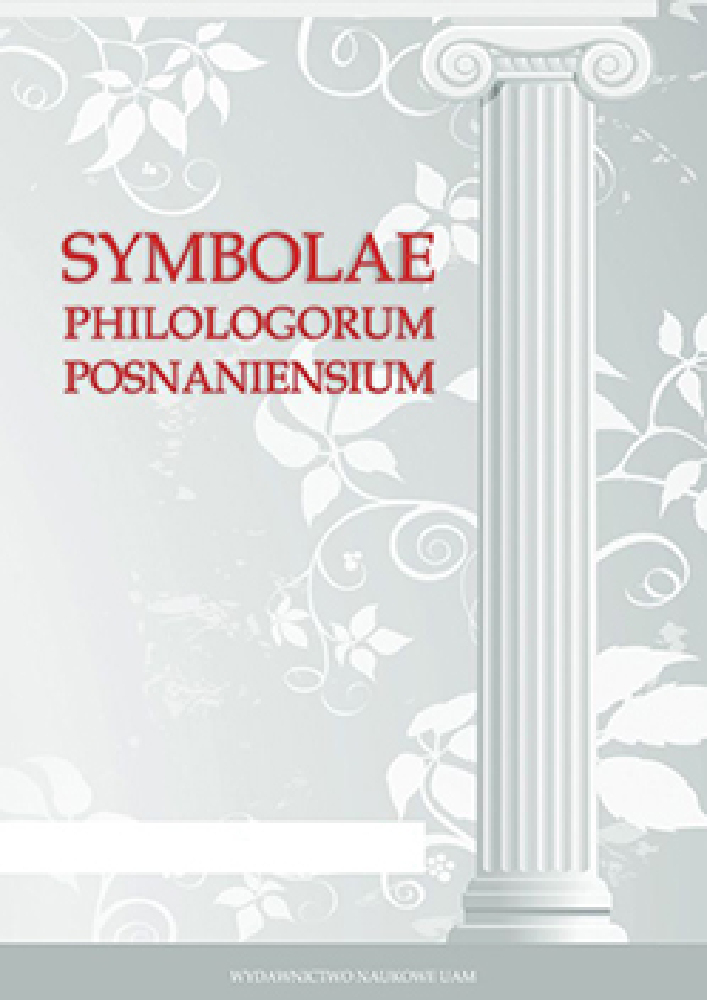Abstrakt
This article explores the thematic and stylistic function of the anaphora in the anonymous fragment of Old Comedy (741 K.-A.). It also analyses an interpretation of Plutarch’s comment on these lines.
Bibliografia
Primary sources
Kassel Austin 1995: R. Kassel, C. Austin, Poetae Comici Graeci (PCG), vol. VIII: Adespota, Berlin-New York.
Secondary sources
Anderson 2021: Anderson, D. A. 2021. “Semantic Satiation for Poetic Effect.” The Classical Quarterly LXXI: 1–18.
Bakola 2010: Bakola, E. 2010. Cratinus and the Art of Comedy. Oxford.
Bergk 1883: Bergk, Th. 1883. Commentationum de Reliquiis Comoediae Atticae Antiquae libri duo. Lipsiae.
Bowie 2002: Bowie, E. L. 2002. “Ionian Iambos and Attic Komoidia: Father and Daughter, or Just Cousins?.” In The Language of Greek Comedy. Ed. A. Willi, Oxford, 33–50.
Coulter 2016: Coulter, H. G. 2016. Review of Nordgren 2015, https://bmcr.brynmawr.edu/2016/2016.11.17/, (accessed February 18, 2021).
Denniston 1966: Denniston, J. D. 1966. The Greek Particles. Oxford.
Dover 2002: Dover, K. J. 2002. “Some Evaluative Terms in Aristophanes.” In The Language of Greek Comedy. Ed. A. Willi. Oxford, 85–97.
Fehling 1969: Fehling, D. 1969. Wiederholungsfiguren und ihr Gebrauch bei den Griechen vor Gorgias. Berlin.
Fowler 1936: Fowler, H. N. 1936. Plutarch, Moralia, vol. X. Cambridge (Mass.)–London (reprinted 2002).
Hunter 2014: Hunter, R. 2014. “Attic Comedy in the Rhetorical and Moralising Tradition.” In The Cambridge Companion to Greek Comedy. Ed. M. Revermann. Cambridge, 373–386.
Marshall 2020: Marshall, C. W. 2020. Aristophanes. Frogs. London.
Nordgren 2015: Nordgren, L. 2015. Greek Interjections. Syntax, Semantics and Pragmatics. Berlin–Boston.
Parker 1997: Parker, L. P. E. 1997. The Songs of Aristophanes. Oxford.
Russell 1989: Russell, D. A. 1989. “Greek Criticism of the Empire.” In The Cambridge History of Literary Criticism, vol. I. Ed. G. A. Kenney. Cambridge, 279–329.
Russell 2001: Russell, D. A. 2001. Plutarch. Bristol.
Slings 1997: Slings, S. R. 1997. “Figures of Speech and their Lookalikes: Two Further Exercises in the Pragmatics of the Greek Sentence.” In Grammar as Interpretation: Greek Literature in its Linguistic Context. Ed. E. J. Bakker. Leiden, 169–214.
Slings 2002: Slings, S. R. 2002. “Figures of Speech in Aristophanes.” In The Language of Greek Comedy. Ed. A. Willi. Oxford, 99–109.
Sommerstein 2002: Sommerstein, A. H. 2002. „Comic Elements in Tragic Language: The Case of Aeschylus’ Oresteia.” In The Language of Greek Comedy. Ed. A. Willi. Oxford, 151–168.
Storey 2011: Storey, I. C. 2011. Fragments of Old Comedy, vol. III: Philonicus to Xenophon. Adespota, Cambridge (Mass.)–London 2011.
West 1974: West, M. L. 1974. Studies in Greek Elegy and Iambus. Berlin–New York.
Willi 2002: Willi, A. 2002. “The Language of Greek Comedy: Introduction and Bibliographical Sketch.” In The Language of Greek Comedy. Ed. A. Willi. Oxford, 1–32.
Zimmermann 2011: Zimmermann, B. 2011. Handbuch der griechischen Literatur der Antike. Hrsg. von B. Zimmermann. München.
Licencja
Prawa autorskie (c) 2021 Krystyna Bartol

Utwór dostępny jest na licencji Creative Commons Uznanie autorstwa 4.0 Międzynarodowe.

